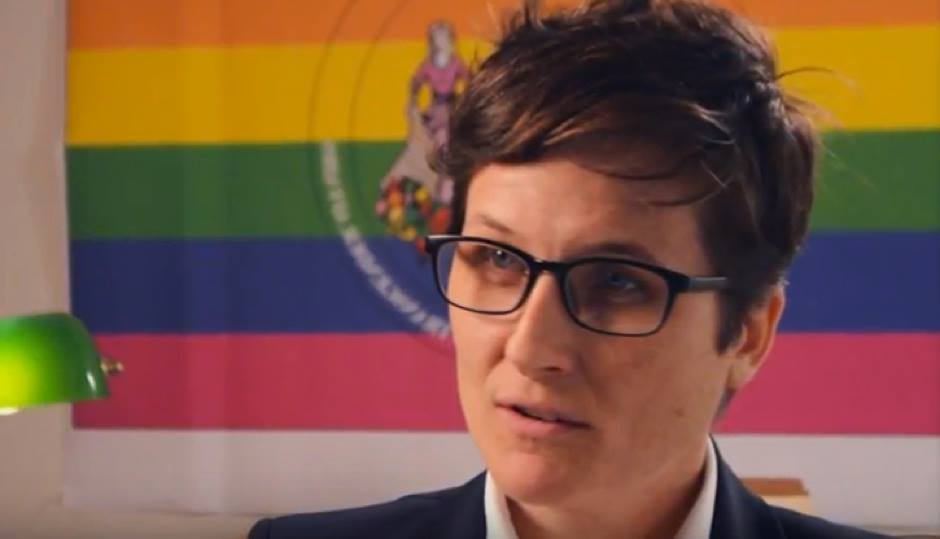OPINION: It’s Time to Rethink the Office of LGBT Affairs

Nellie Fitzpatrick, director of the Office of LGBT Affairs. (Screen capture from Philly 311 video)
On Monday, the Philadelphia Commission on Human Relations (PCHR) released its highly anticipated report on Gayborhood racism, whose findings confirmed that the city’s LGBTQ community has suffered from more than 30 years of unchecked racial discrimination. At a City Hall press conference, Mayor Jim Kenney spoke about working with PCHR to improve race relations within the LGBTQ community. Not beside him at the podium and unavailable for comment was the director of the Office of LGBT Affairs, Nellie Fitzpatrick.
Fitzpatrick has been criticized repeatedly for failing to prioritize Gayborhood racism in the office’s agenda. In October 2015, she attended an community town hall at the William Way Center at which individuals of color denounced the racial discrimination they had experienced at Gayborhood bars and nonprofits. That evening, she described herself as being “hopeful that this incredible event creates a needed space not only in Center City, but all throughout Philadelphia.” Sitting across from Fitzpatrick was Shani Akilah, a then-employee of HIV/AIDS advocacy nonprofit Philadelphia FIGHT, who wanted attendes to know that “our community have a right to feel safe and secure in spaces that claim they are about inclusion and diversity.”
Fast-forward to October 2016: Akilah, no longer working at Philadelphia FIGHT, has recently co-founded the Black and Brown Workers Collective (BBWC), a group of LGBTQ intersectional activists who began protesting what they perceive as government inaction on Gayborhood racism. Early in the month, the BBWC sends a list of demands to the Office of LGBT Affairs and days later calls for Fitzpatrick’s resignation during a public ceremony at which Fitzpatrick is receiving an award. During the protest, Fitzpatrick asks the crowd of black and Latinx LGBTQ demonstrators, “When we are talking about intersectionality … I’d like to know where you all are when trans women of color are being murdered in our city?”
Such tone-deaf remarks and an overall lack of transparency and engagement from the Office of LGBT Affairs make Fitzpatrick an unsuitable choice to remain as the city’s LGBT liaison at a time when it seems as though the wider community is finally beginning to acknowledge that real work needs to be done. And that very work is why the office itself needs to be reevaluated.
First, the Office of LGBT Affairs needs to evolve structurally. Fitzpatrick was its only employee, tasked by the Mayor’s Office with dealing with the entire LGBTQ community. Given the growing complexity and volume of the issues the department must address, an additional staffer to assist the director is a must. Equally important is that the new director or the second staff member be a person of color and/or someone non-cisgender to bring crucial broader community insight to the office.
Furthermore, the public deserves a clear-cut understanding of what the office can and cannot do. Over time, the role of LGBT liaison has morphed from policy champion to community mobilizer to community figurehead. Michael Hinson, the city’s first official LGBT liaison, worked with City Council to update the city’s charter to include LGBT language. His successor, the late Gloria Casarez, helped the city find ways to support LGBTQ community-based initiatives such as the Philly Trans March. Fitzpatrick has been a spokesperson for specific LGBTQ issues, notably crimes against trans women, but she hasn’t really pushed hard for community-wide initiatives or organizing.
Now that Mayor Kenney has received recommendations from PCHR, he needs to ask himself what the realistic purpose and scope of the Office of LGBT Affairs is. It was PCHR, not his LGBT liaison, that conducted a public hearing attended by more than 375 community members, some 50 of whom offered spoken testimony. It is PCHR that is hosting “Know Your Rights” training seminars and directly investigating a problem that the Office of LGBT Affairs should have been directly tackling for more than a year. If PCHR is the government agency that’s really protecting the civil rights of LGBTQ individuals, what can the Office of LGBT Affairs do differently to better serve the community?
In an era of Trump, there’s no room for a department that only passively supports our city’s most vulnerable communities. With clear-cut PCHR recommendations and a soon-to-launch LGBT affairs commission that will help hold the city more accountable, the community deserves a new vision for the office and a liaison who is better equipped to serve it. It took 30 years for a major hurdle in the city’s LGBTQ community to be properly confronted, and we need strong leadership to ensure history doesn’t repeat itself.


